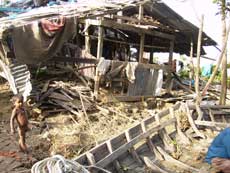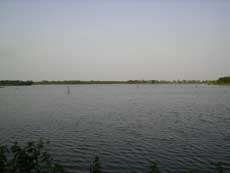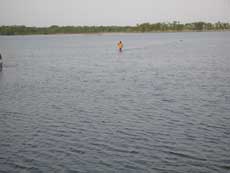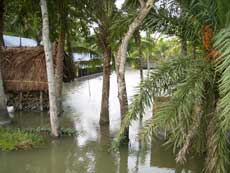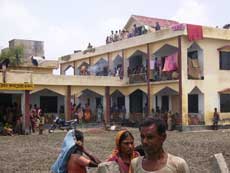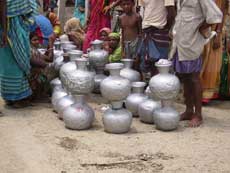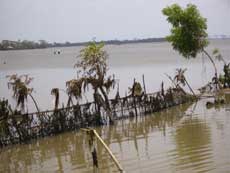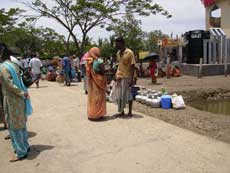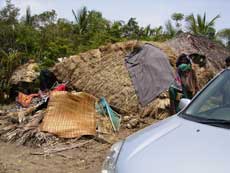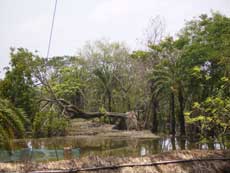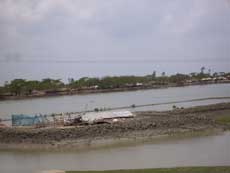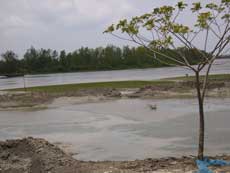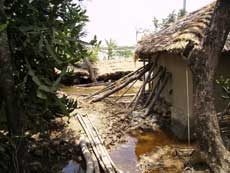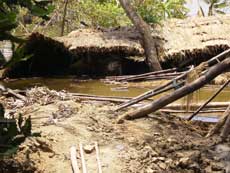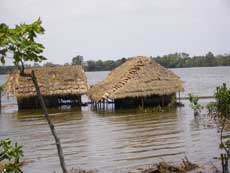
News (828)
Dutch Ministers visit BRAC in Khulna and Bagerhat
06 July 2009, Dhaka. Mr. Bert Koenders, the Dutch Minister for Development Cooperation, and Ms. Tineke Huizinga, the Dutch State Minister for Transport, Public Works and Water Management, visited BRAC programmes in Khulna and Bagerhat on Sunday, 5 July, 2009. They were accompanied by the Dutch Ambassador, Ms. Bea ten Tusscher, Dr. Mahabub Hossain, Executive Director of BRAC and the BRAC Directors Dr. Safiqul Islam and Dr. Babar Kabir.
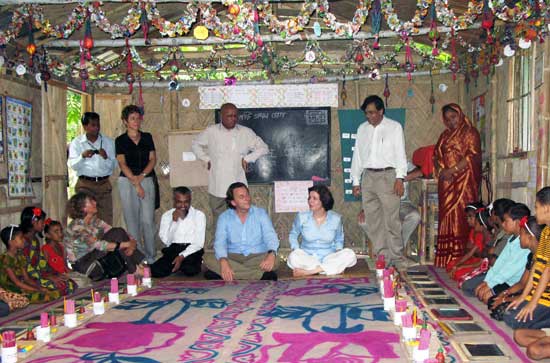
The delegation first visited a BRAC Adolescent Development Centre in Moubhog. They spoke to the adolescent girls group and inquired about their reproductive health awareness. Then the delegation visited a BRAC Primary school in upper Moubhog and another one in Narkeli Chandpur. The Ministers spoke to the students about their studies. They also spoke to a differently abled student and inquired about the facilities being provided to her by the BRAC school. The Ministers were treated with a song and dance routine by the school students. Later on the Ministers also visited a Government Primary school.
The delegation then met with a BRAC Village WASH Committee in Kajdia. The field visit was concluded with a short meeting with local government officials and BRAC staff at the Rupsha BRAC Office.
Reflecting on his first field visit in Bangladesh, Mr. Koenders said that it had been a very exciting and useful experience. He expressed his appreciation for the important and successful efforts that were made by BRAC to provide basic social services such as education and sanitation, to isolated rural communities. He emphasised that these services are a basic human right and essential for human development. He also added that he was very pleased to note in the field the constructive collaboration and cooperation between Government and BRAC.
He recognised that the challenges to achieve universal access to social services are enormous because the demand for them is still increasing due to population growth. At the same time, he explained, it is equally important to ensure that these services are of good quality. He emphasised that the role of local communities and local governments is very important. He added that the meetings with local committees, health staff and teachers have shown that real progress is being made.
Abed Awarded Honorary Doctorate by Oxford University
25 June 2009, Dhaka. BRAC Founder and Chairperson, Fazle Hasan Abed, was awarded the honorary Doctor of Letters by the University of Oxford in the United Kingdom for his role as "a tireless defender of the needy". Mr. Abed was admitted the degree on Wednesday, 24 June, along with five other leading figures from the world of development, the arts and science, by Oxford University chancellor, the Rt Hon Lord Patten of Barnes, at Encaenia, the annual honorary degree ceremony.
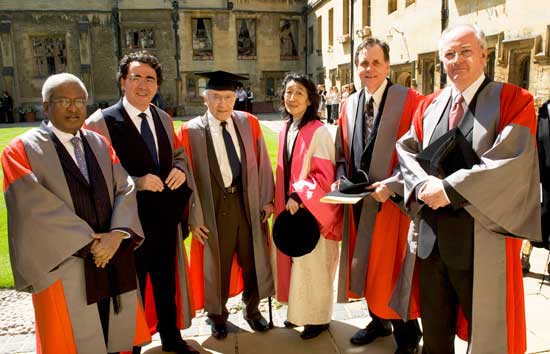
Honorands at the 2009 Encaenia ceremony. From left to right : Fazle Hasan Abed, Dr Santiago Calatrava-Valls , Professor Erwin L Hahn , Dame Mitsuko Uchida ,Professor Barry Marshall, Mr Philip Pullman [Photo: University of Oxford]
"He regards poverty not as a simple phenomenon but as one with complex causes, which there is no possibility of eliminating without analysis of its nature and origin. He wants to help the needy to help themselves; he nourishes their mind as well as their bodies, appreciating that education is the engine of economic development. Above all, he has insisted on the rights of women, arguing that unless they get a fair share of respect and resources, men themselves will not succeed in overcoming poverty... I present a tireless defender of the needy, a citizen of Bangladesh and of the whole world, Fazle Hasan Abed, to be admitted to the honorary degree of Doctor of Letters," reads Abed's citation.
Oxford, the oldest university in the English-speaking world with nine centuries of continuous existence, is consistently ranked among the world's top ten universities. Previous recipients of Oxford's honorary degrees include Nobel Laureates Rabindranath Tagore and Amartya Sen, former Indian prime minister Indira Gandhi, American author Mark Twain and former American president Jimmy Carter.
Abed founded BRAC in 1972 to help rehabilitate returning refuges from India to newly independent Bangladesh. Later, BRAC changed its focus to long-term community development. Today, BRAC is the largest non-governmental organisation in the world and its programmes in education, health, economic and social development and human rights and legal services cover a population in excess of 100 million. In addition to numerous national and international awards, Abed was previously awarded degrees of Doctor of Laws by Queen's University in Canada, Doctor in Education by the University of Manchester in the United Kingdom and Doctor of Humane Letters by Yale University in the United States in recognition of his work with BRAC.
Learning from Neighbours: Symposium on Thai Education in City
24 June 2009, Dhaka. A two-day symposium on educational progress in Thailand will be held in city on 27-28 June. A three-member team headed by Dr. Kasama Varavarn, Secretary General of the Thai Ministry of Education, will share its experience with officials, academics and policy-makers in Bangladesh. Dr. Q.K. Ahmed, co-chair of the Education Policy Committee, will inaugurate the symposium on Saturday, 27 June at the Lake Shore Hotel in Gulshan.
BRAC University Institute of Educational Development, jointly with Bangladesh Institute of Development Studies (BIDS) and Campaign for Popular Education, (CAMPE) will host the event. Members of the Education Policy Committee, Parliamentary Standing Committee members for the two education ministries, education officials, academics and development partner representatives have been invited. This will be the first event of the "Learning from Neighbours" symposia series planned by BRAC University and the partner institutions to look at experiences of Asian countries.
Thailand and other Asian countries have made spectacular progress in education and economic development in recent decades. The newly elected government of Bangladesh has given high priority to educational development in its longer term Vision 2021 and its election pledges. An Education Policy Committee has been appointed to formulate education policy priorities. The symposia series, starting with Thailand, has been planned as a contribution to the national initiative.
BRAC Tea Estate Recieves Prime Minister's National Award for Afforestation-2008
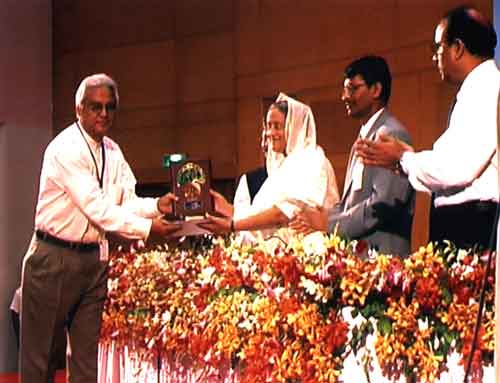
03 June 2009, Dhaka. BRAC’s Kaiyachreea Dalu Tea Estate, Bhujpur, Fatikchari, Chittagong won the First Prize for the Prime Minister’s National Award for Afforestation-2008 for the Agar (Aquilaria) Plantation Project. Mr. Saieed Bakth Mozumder, Director of BRAC Tea Estates Division, received the award from Honorable Prime Minister on 31st May 2009, at the Bangladesh-China Friendship Conference Centre, Dhaka.
Relief Activities by BRAC for the Cyclone Aila Affected People
27 May 2009, Dhaka. The recent cyclone Aila caused massive destruction and devastation in the southern and south-western part of Bangladesh. BRAC, as an immediate response to this calamity has approved Taka 1 (one) crore from its own fund for primary relief activities. BRAC has already started to distribute pure drinking water, water purifying tablets, rice flakes and molasses in the affected region. For coordination and the smooth operation of the relief activities one of the Directors from BRAC Head Office is already working in the cyclone affected areas as well as all BRAC staffs of the affected Upazillas are engaged in these relief activities. Necessary steps to mobilise more funds for the victims are being taken by BRAC.
Relief Activities by BRAC for the Cyclone Aila Affected People
27 May 2009, Dhaka. The recent cyclone Aila caused massive destruction and devastation in the southern and south-western part of Bangladesh. BRAC, as an immediate response to this calamity has approved Taka 1 (one) crore from its own fund for primary relief activities. BRAC has already started to distribute pure drinking water, water purifying tablets, rice flakes and molasses in the affected region. For coordination and the smooth operation of the relief activities one of the Directors from BRAC Head Office is already working in the cyclone affected areas as well as all BRAC staffs of the affected Upazillas are engaged in these relief activities. Necessary steps to mobilise more funds for the victims are being taken by BRAC.
BRAC University and ICDDR,B co-host swine flu seminar
24 May 2009, Dhaka. BRAC University and the International Center for Diarrheal Disease Research, Bangladesh (ICDDR,B) co-sponsored a seminar on the H1N1 virus (popularly known as the swine flu) on May 21st. Scholars and health professionals gathered at Swine Flu: Global and Local Perspective to emphasise the importance of preventative measures and education to curb the potential for H1N1 outbreaks. The participants agreed that preventative hygienic actions are crucial, particularly in the developing world.
More than 10,000 cases of swine flu have officially been reported to the WHO in 41 countries.
Dr. Stephen P Luby, head of Programme for Infectious Disease and Vaccine Sciences Division (PIDVS), ICDDR,B, underscored the need for individuals be mindful of simple hygienic practices. "In order to prevent any potential outbreak in Bangladesh, people must improve their respiratory hygiene – by sneezing into their elbows instead of into their hands or into the air, practice social distancing, wash hands often throughout the day with soap and water, and refrain from smoking as it impairs respiratory systems."
And one of BRAC’s programmes is the Water, Sanitation, and Health programme (WASH), which was started in 2006 with the aim of providing hygiene education for 37.5 million people. Promoting the same practices that prevent the spread of swine flu, WASH uses the Shebikas to reach community people, and BRAC concurrently works to improve water supplies and sanitation services in their homes and their schools.
BRAC announces USD 1.5 million contribution to Nepal

BRAC, the international NGO based in Bangladesh, announces contribution of USD 1 million from its fund to Nepal earthquake victims. In addition to this, BRAC Bangladesh, BRAC Bank and BRAC University staff will contribute their one-day basic salary, which is USD 300,000 in total. BRAC Social Enterprises will also contribute another USD 200,000, totalling BRAC’s contribution to Nepal to USD 1.5 million. Moreover, BRAC already took initiative to mobilise USD 15 million from international donors. BRAC International and BRAC’s affiliates in UK and USA will raise these additional funds.
BRAC will start its support activities in one of the most affected areas of Nepal, Nuwakot. Explaining the initiative, senior director of strategy, communications and empowerment of BRAC and BRAC International, Asif Saleh said, “From the very beginning, BRAC has been dedicated to improving the lives of people. We believe it is BRAC’s mandate to come in and aid our neighbouring country, as it faces a major humanitarian crisis. BRAC has years of experience in emergency disaster response. We successfully carried out operations in Haiti, after the devastating earthquake in 2010, Sri Lanka, and in Indonesia after the deadly tsunami in 2004”.
The two yearlong support programme in Nuwakot includes household support for 2,000 household, rehabilitation of 200 maimed earthquake victims (both short-term and long-term), psychosocial rehabilitation of 30,000 earthquake victims, and livelihood support for 5,000 households.
BRAC International already contributed USD 50,000 from its fund to the earthquake-stricken nation. An emergency medical team from BRAC has been sent to Nepal to provide medical treatment, essential medicine and dry food to earthquake victims. This team is working in Dolekha, Bhaktapur, Sindupalchawk, Lalitpur, and Kathmandu in collaboration with the Nepalese government.
BRAC’s work with acid survivors recognised
16 May 2009, Dhaka. BRAC received an award at the International Conference of Acid Survivors held at the Engineers Institution auditorium in Dhaka on May 13, for its work with victims of acid throwing in Bangladesh. Acid Survivors Foundation (ASF) Bangladesh organised the international conference bringing together 600 people -- who were acid survivors, or their relatives or people working for organisations that help acid attack survivors.
Victims of acid attacks are generally women, and they suffer severe burns and life-long pain and disfigurement.
BRAC takes a holistic approach in helping victims of acid attacks, providing them access to medical and psychological treatment as well as access to legal services for them to bring the assailants to justice.
Ugandan Vice President observes BRAC Programmes in Manikganj
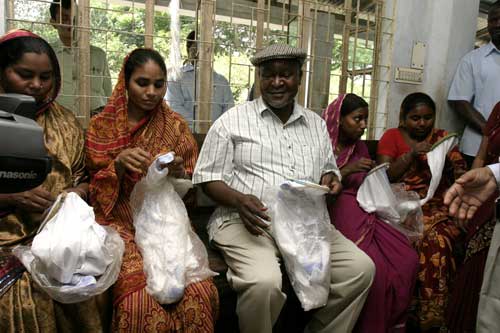
10 May 2009, Dhaka. Ugandan Vice President Professor Gilbert Bukenya visited various BRAC programmes in Manikganj today (10.05.09). During the visit, Professor Bukenya told local journalist that Bangladesh is a fantastic country. He said that the country has changed vastly in just a few years due to organisations like BRAC.
Gilbert Bukenya traveled from Dhaka early morning to Noyadingi in Manikganj to observe BRAC's Sanitary Napkin Production Centre. He explored the different sections of the handmade napkin factory and spoke to the workers. He also met with a BRAC health volunteer (shashthya shebika) and enquired about her daily work. Later he visited the Ayesha Abed Foundation sub-centre in Sadarpur, Manikganj. Professor Bukenya was impressed by watching almost hundred poor women doing embroidery together.
On his way to the BRAC regional office he stopped at a handloom weaving centre in Gorpara, Manikganj where he viewed handloom weaving and embroidery.
At the regional office, the Ugandan Vice President spoke to local journalists and stated that he visited Bangladesh on a previous occasion while he was a student. He said that the country has changed greatly since then. Professor Bukenya also stated that he will try to replicate BRAC's employment generation enterprises in his country to eradicate poverty. Later he visited the Ayesha Abed Foundation handicraft production and training centre and a milk chilling centre in Dorogram, Manikganj. He also met BRAC microfinance borrowers with livestock enterprises in the same village.
The Ugandan Vice President was accompanied by Mr. H.E. Madhvani, the Ugandan High Commissioner to Dhaka (based in Delhi), and from BRAC, the Executive Director of International Programmes Md. Aminul Alam and Deputy Executive Director Dr. Imran Matin.
The Ugandan Vice President arrived in Dhaka last Thursday for a six-day visit. BRAC began operations in Uganda in 2006 and has quickly grown to become on the largest micro credit providers in the country. BRAC also has integrated programmes in health, education, agriculture and livestock, adolescent development, capacity building, training and research.
Join the world’s biggest family


